About midway through the 2023 session of the Texas Legislature, the Texas Hospital Association is tracking more than 1,600 pieces of legislation. If you’re a normal person, you don’t have the stomach or the synapses for a summary of all of them. No one does.
However, significantly fewer bills than that speak to THA’s top priorities for this session – and out of that subset, some have risen to become the most likely vehicles for the most pressing priorities hospitals have in 2023 – covering expanded Medicaid coverage for new moms, hospital workforce expansion, workplace safety, improving behavioral health and much more.
If you need something approaching an Executive Summary of the biggest pieces of legislation hospitals are trying to get passed this session, The Scope is here to help. Here are summaries and status updates on 10 important bills that THA strongly supports and/or is the driving force behind during this session. They are presented in order of their bill number – House bills first, then Senate – with their authors, companion bills (if applicable), details and most recent activity. One bill of outsized importance that we’ll cover at another time: the ever-fluid bill to set the 2024-25 state budget, the vehicle for most health care and hospital funding needs.
HOUSE BILLS
House Bill 12 – Medicaid Postpartum Coverage Expansion
Primary author: Rep. Toni Rose (D-Dallas)
What it does: Extends postpartum Medicaid coverage for new mothers from the current two months to one year, ensuring moms will be covered during a time frame when data show many postpartum complications and deaths occur.
Status: The House Select Committee on Health Care Reform has voted out (i.e. approved) HB 12, making it eligible for consideration by the full House.
House Bill 49 – Hospital Investigation Transparency
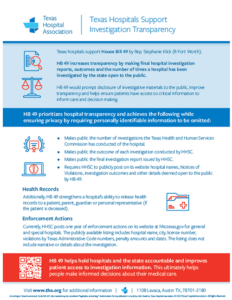
Primary author: Rep. Stephanie Klick (R-Fort Worth)
What it does: Improves transparency for the public by making public the number of investigations the Texas Health and Human Services Commission (HHSC) has conducted of a hospital; the outcome of those investigations; and the final investigation report. It also requires HHSC to publicly post hospital names, notices of violations and investigation outcomes on its website. THA worked on compromise language with the bill author.
Status: HB 49 has passed the House, sending it to the Senate side for consideration.
House Bill 1236 – Coverage of Emergency Care
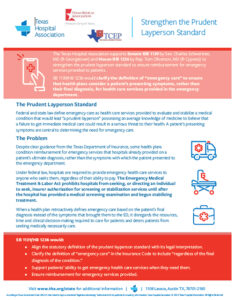
Primary author: Rep. Tom Oliverson, MD (R-Cypress)
Companion: Senate Bill 1139 by Sen. Charles Schwertner, MD (R-Georgetown)
What it does: Clarifies that health insurers must base coverage for emergency care not on the final diagnosis, but on a “prudent layperson’s” understanding of medicine in perceiving whether the emergent event was in fact an emergency. THA initiated this legislation in response to growing issues with health plan denials on reimbursement of emergency care.
Status: HB 1236 has been voted out of the House Committee on Insurance.
House Bill 1890 – Hospital-at-Home
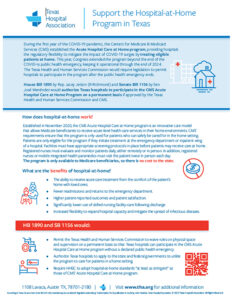
Primary author: Rep. Jacey Jetton (R-Richmond)
Companion: Senate Bill 1156 by Sen. Jose Menendez (D-San Antonio)
What it does: Allows for Texas hospitals to continue operating the federally approved hospital-at-home programs that helped them manage surge capacities during COVID-19. HHSC would have to establish minimum standards to operate a hospital-at-home program that are as stringent under Medicare’s Acute Hospital Care at Home waiver program. THA initiated this bill in order to formalize an HHSC process to continue hospital-at-home, which is approved at the federal level through the end of 2024.
Status: HB 1890 was voted out of the House Committee on Public Health.
HB 2337 – Partial Hospitalization/Intensive Outpatient Therapy
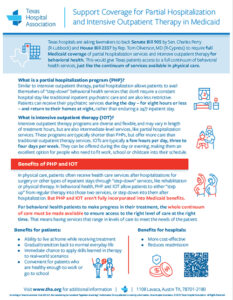
Primary author: Rep. Oliverson
Companion: SB 905 by Sen. Charles Perry (R-Lubbock)
What it does: Requires full Medicaid coverage of partial hospitalization services and intensive outpatient therapy for behavioral health. Availability of these services carries considerable benefits for both eligible patients and for hospitals, as explained in a recent THA white paper. THA’s Behavioral Health Council initiated this legislation to increase access to care.
Status: HB 2337 has been heard in the House Human Services Committee.
House Bill 3504 – Behavioral Health and Court Orders
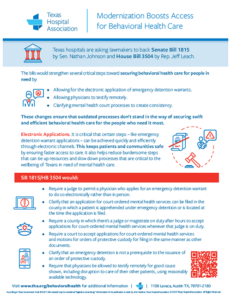
Author: Rep. Jeff Leach (R-Plano)
Companion: Senate Bills 1815 and 1816 by Sen. Nathan Johnson (D-Dallas)
What it does: Updates outdated behavioral health processes by allowing for the electronic application of emergency detention warrants; requiring judges to allow physicians to testify remotely rather than in-person if needed; clarifies the process for applying for court-ordered mental health services with respect to the location of the patient; requires counties to accept those applications after hours if the county has a judge or magistrate on duty at that time.. THA has been working extensively with stakeholders for a number of years on developing this legislation, which is aimed at creating more overall consistency and accountability in the court process for mental health patients.
Status: House Bill 3504 has been heard in the House Committee on Judiciary & Civil Jurisprudence.
SENATE BILLS
Senate Bill 240 – Workplace Violence
Primary author: Sen. Donna Campbell, MD (R-New Braunfels)
Companion: HB 112 by Sen. Donna Howard (D-Austin)
What it does: Requires hospitals to maintain a workplace violence prevention committee and to provide training or education on workplace violence at least annually; prohibits discouraging providers or other employees from reporting workplace violence, or disciplining or firing them for doing so. THA worked collaboratively with the Texas Nurses Association to craft this the bill’s language.
Status: SB 240 has passed the full Senate. Additionally, HB 112 was voted out by the House Public Health Committee.
Senate Bill 25 – Post-Secondary Nursing Education
Primary author: Sen. Lois Kolkhorst (R-Brenham)
What it does: This THA-priority workforce legislation is aimed at improving the availability of both faculty and clinical spots at state nursing schools. It removes a current annual cap of $7,000 on the amount of loan repayment assistance nurses can receive for working as faculty in a nursing degree program, instead basing the amount on the proportion of hours the nurse worked as a faculty member to the number of hours worked as a full-time nurse; expands eligibility for part-time faculty nurses to apply for loan repayment programs; and revives a dormant nursing scholarship fund.
Status: The full Senate has passed SB 25, sending it to the House for consideration.
Senate Bill 1433 – Electronic Emergency Detention Orders
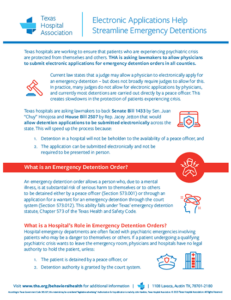
Author: Sen. Juan “Chuy” Hinojosa (D-McAllen)
Companion: House Bill 2507 by Rep. Jetton
What it does: Allows electronic emergency detention orders to be submitted electronically in all counties across the state – speeding up a process that often requires waiting for a peace officer to come detain a patient; ensures that peace officers can execute a warrantless detention order for a patient located in a hospital. THA has been working extensively with stakeholders on developing this legislation to improve existing processes.
Status: SB 1433 has been referred to the Senate Committee on Criminal Justice but has not been scheduled for a hearing.
SB 1903 – Behavioral Health Tech Grants
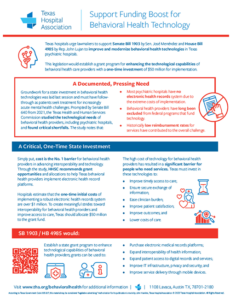
Author: Sen. José Menéndez (D-San Antonio)
Companion: HB 4985 by Rep. John Lujan (R-San Antonio)
What it does: Establishes a grant program to enhance technological capabilities at facilities providing mental health care, with the grant money being used for such improvements as electronic health recordkeeping, expanding interoperability, and improved mental health care delivery using mobile devices. This THA-developed legislation would increase access to care for mental health patients.
Status: SB 1903 has been referred to the Senate Committee on Health & Human Services but has not been scheduled for a hearing.


